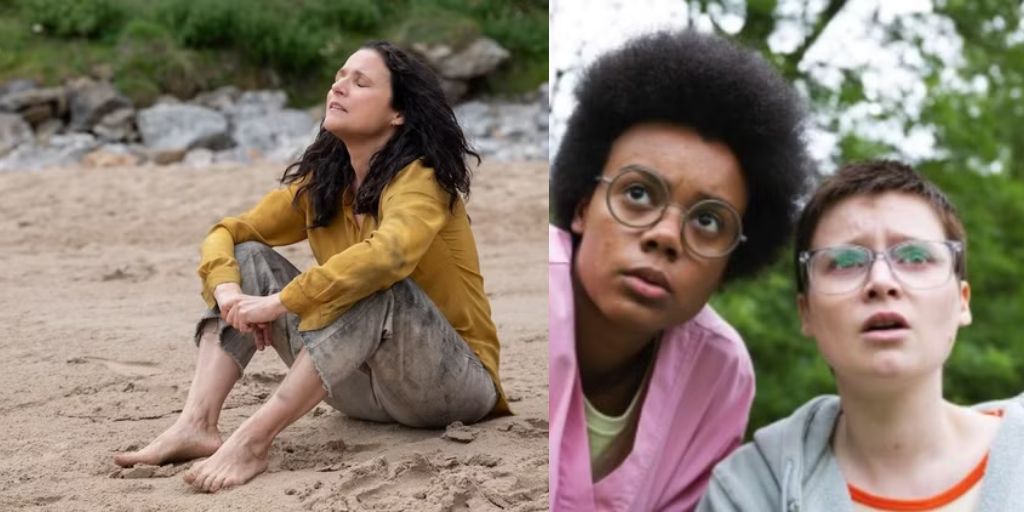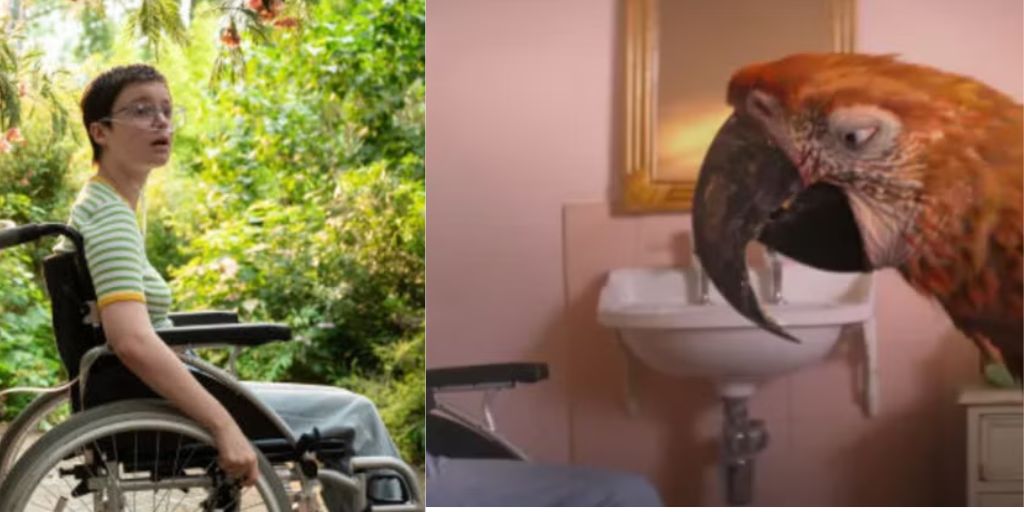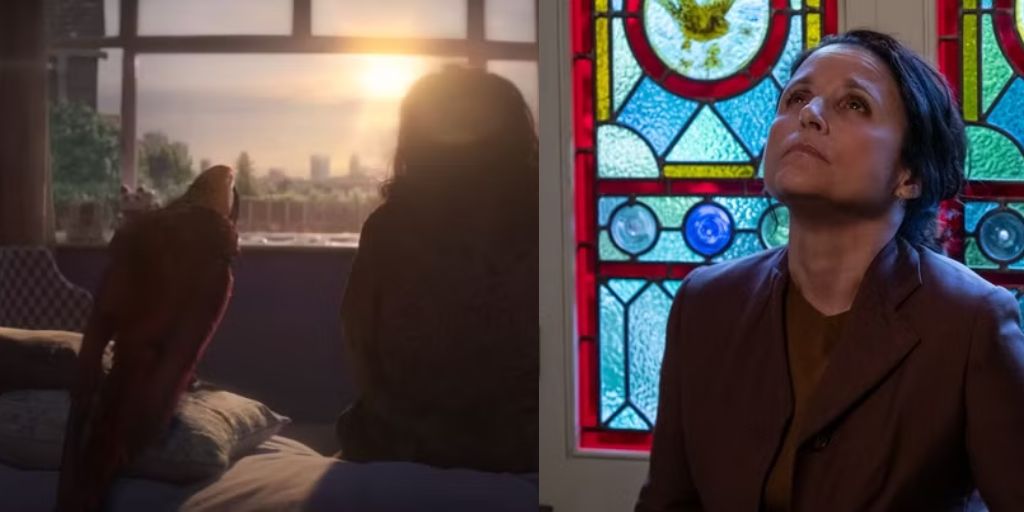Who knew that Julia Louis-Dreyfus, armed with a pair of garden shears, battling Death in the form of a bird, could create such a touching and emotional experience? Tuesday, released in 2024, stands as one of the most beautifully shot and magical films of the year.
Unfortunately, it didn’t get the recognition it deserved upon release. Directed by Daina O. Pusić, the movie features British actor Lola Petticrew as Dreyfus’ terminally ill daughter, and Arinze Kene as the voice of Death.
The film, produced by A24, received high praise from critics for its surreal and visually striking portrayal of death, as well as Dreyfus’ deeply moving performance as a mother facing her own fears of dying.
While it didn’t draw much attention at the box office, Tuesday remains one of 2024’s most beautiful and profound films. Dreyfus delivers a powerful performance under Pusić’s direction, creating a film that is unexpectedly hopeful and thoughtful about death.
What is Tuesday About?
Tuesday tells the story of Zora, an American businesswoman living in London, played by Julia Louis-Dreyfus. Zora lives with her 15-year-old daughter, Tuesday (Lola Petticrew), who is terminally ill with cancer. Instead of spending time with her dying daughter, Zora chooses to avoid her.
She spends her days sitting in coffee shops or on park benches, keeping herself as far away as possible from Tuesday. Meanwhile, a nurse named Billie (Leah Harvey) has been hired to take care of Tuesday. As Zora keeps herself distracted, Billie forms a close bond with the sick teenager.
The film takes a turn when Tuesday nears the end of her life. Death arrives to take her, but not in the form we usually imagine. In Tuesday, Death takes the shape of a parrot, with Arinze Kene providing the voice of this unusual Grim Reaper. Surprisingly, Tuesday and the parrot become friends.
Death agrees to wait for Zora to return home before he takes Tuesday. But when Zora finally comes home and discovers Death in their house, she reacts in a way only a desperate mother would. Instead of facing the reality of her daughter’s impending death, Zora tries to kill Death itself.

Armed with whatever she can find, including garden shears and a shovel, she battles the bird, attempting to destroy it and save her daughter. However, things don’t go as planned, and Zora ends up facing the consequences of her actions, having to take on Death’s duties for a day.
Julia Louis-Dreyfus Delivers a Stunning Performance
Julia Louis-Dreyfus is known for her iconic roles in comedy, from her portrayal of Elaine Benes in Seinfeld to her award-winning role as Selina Meyer in Veep. In Tuesday, she steps away from her usual comedic roles to deliver a deeply emotional and raw performance.
As Zora, Dreyfus plays a woman who is lost in her misery. She is afraid of death, yet she can’t bring herself to face life either. The character is filled with unease, and her sadness is evident in every scene. With a permanent grimace and slouched posture, Zora walks through the streets of London like a ghost, avoiding any connection with the world around her.
Dreyfus’ performance is striking in its subtlety. She doesn’t rely on dramatic gestures or loud outbursts. Instead, her portrayal of Zora is quiet and controlled, showing the pain of a woman who has forgotten how to live but is terrified of dying.
This marks a significant shift from the energetic and often sarcastic characters Dreyfus has played in the past. In Tuesday, she strips away much of her comedic persona to reveal a mother who is numb, disconnected, and full of regret.
The emotional peak of the film comes in a scene on the beach, where Zora finally allows herself to feel the weight of everything she has been holding inside. After spending the majority of the film trying to avoid her emotions, Zora breaks down and faces the reality of her daughter’s illness.
In this powerful scene, Zora confronts Death and is finally able to face her daughter, reassuring her that she will be okay after she passes. This moment is beautifully filmed by Pusić, using a series of close-up shots to capture every tear and expression on Dreyfus’ face. It’s a heart-wrenching scene and one of Dreyfus’ most memorable performances on screen.
Tuesday Combines Dark Comedy and Fantastical Elements
While Tuesday is a film about death and loss, it also contains elements of dark comedy. Daina O. Pusić, the director, masterfully balances the heavy themes of the film with moments of absurdity and humor. This blend of tragedy and comedy makes the film stand out, offering viewers a unique and surreal take on death.
One of the most memorable scenes is Zora’s battle with Death in her garden. Armed with garden tools, Zora tries to defeat the parrot, setting it on fire, beating it with a shovel, and even swallowing it whole.
The scene is absurd and over-the-top, but it works because of Dreyfus’ impeccable comedic timing and the cleverness of Pusić’s script. What should feel tragic becomes strangely humorous, as Zora’s desperate attempt to fight off Death becomes almost slapstick in its execution.
Dreyfus was the perfect choice for this role because of her natural ability to balance comedy and drama. In an interview with The New Yorker, Dreyfus spoke about the emotional weight of the role and how it pushed her as an actor.
“You have to flirt emotionally with stuff in a very real way to give authenticity to a performance, and it was a hard thing to do. And it was a hard thing to recover from after,” she said. Dreyfus’ ability to tap into both the humor and sadness of the situation gives the film a unique tone, where viewers can laugh even in the face of death.
Pusić’s direction is a key element in the film’s success. She handles the delicate balance of tragedy and comedy with care, ensuring that the film’s emotional moments are never overshadowed by its more humorous ones.
The fantastical elements of the story, such as the personification of Death as a parrot, add a layer of surrealism to the film.
But instead of making the story feel disconnected from reality, these fantastical elements help to deepen the emotional impact. The parrot’s friendly yet foreboding presence becomes a symbol of the inevitable, and Zora’s battle against it is both absurd and meaningful.
Tuesday Is a Beautiful and Thoughtful Reflection on Death
Tuesday takes on a subject that many films shy away from—death. Instead of presenting death as something to fear, the film portrays it in a way that feels both comforting and hopeful. Through its surreal imagery and unique narrative, the film encourages viewers to think about death not as an end, but as a part of life.
The relationship between Tuesday and Death is one of friendship, showing that even in the face of something as final as death, there can be connection and understanding.
Zora’s journey throughout the film is one of self-discovery. She starts the film in denial, unable to face the reality of her daughter’s illness or her own fears of death. But by the end, she is forced to confront her deepest fears. Her battle with the parrot is a metaphor for her fight against accepting the inevitable.
Through this surreal and often humorous battle, Zora begins to come to terms with her daughter’s fate and her own mortality. The film ends on a hopeful note, with Zora finally able to connect with her daughter and assure her that everything will be okay, even after she’s gone.
The visuals in Tuesday are another standout aspect of the film. The cinematography captures both the gray, lifeless world that Zora moves through and the magical, surreal elements that come into play as the story unfolds.
The use of color, light, and framing helps to convey the emotional tone of the film. Pusić’s use of close-ups during key emotional moments allows viewers to feel the intensity of the characters’ emotions, drawing them deeper into the story.
Why Tuesday Deserves More Attention
Despite its critical acclaim, Tuesday struggled to gain widespread recognition at the box office. This could be due to its unconventional approach to storytelling or the fact that it deals with a heavy and often uncomfortable subject.

However, for those who take the time to watch it, Tuesday offers a deeply moving and thought-provoking experience. It’s a film that stays with you long after the credits roll, prompting reflection on life, death, and the relationships we leave behind.
Julia Louis-Dreyfus’ performance alone makes Tuesday worth watching. Her ability to shift from comedy to drama easily shows her range as an actor. Under Pusić’s direction, Dreyfus gives one of her most powerful performances. The film’s unique blend of dark comedy and surreal imagery creates a viewing experience unlike any other.
For those who appreciate films that tackle difficult topics with both heart and humor, Tuesday is a must-see. It’s a film that challenges viewers to think about life and death in a new way, offering a message of hope and acceptance in the face of loss.




